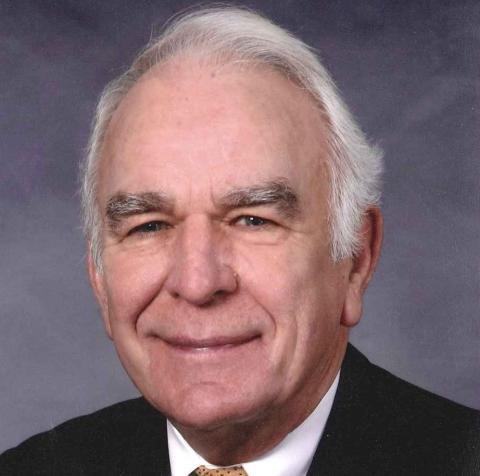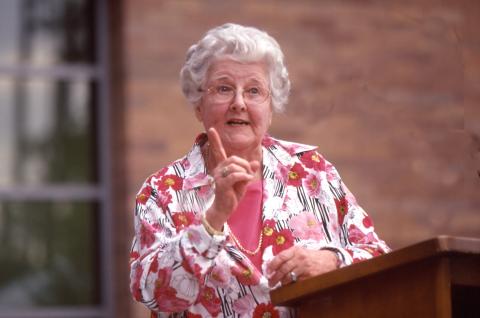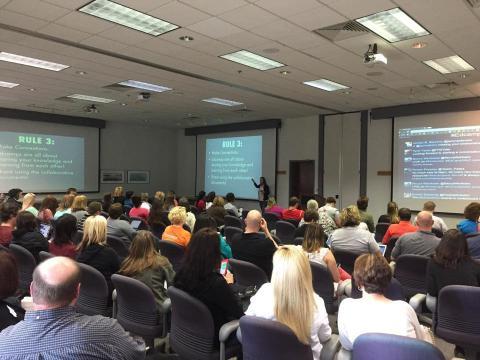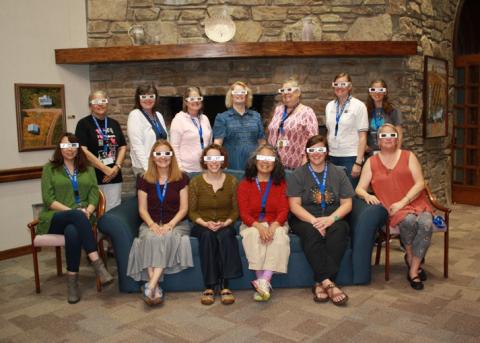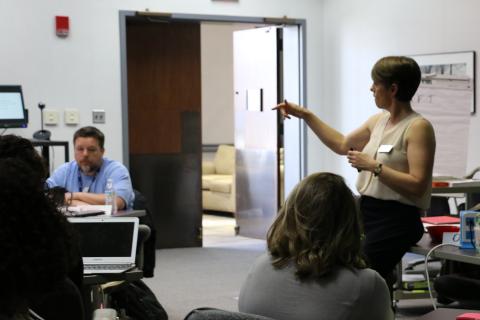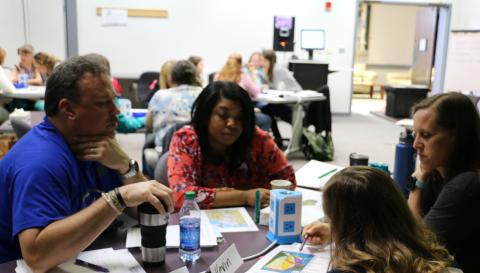The R. Phillip Haire Honored Educator Scholarship has reached full endowment and will begin providing annual support for a North Carolina public school teacher to attend a professional development program at the North Carolina Center for the Advancement of Teaching, beginning academic year 2017–2018.
NCCAT Remembers Jean Powell
CULLOWHEE—Jean Paul Powell, a distinguished educator who first proposed the idea of the North Carolina Center for the Advancement of Teaching, passed away on Tuesday, May 16, 2017. She was 98.
A visitation will be held from 7–8 p.m. Friday, May 19, 2017, at Crumpler Funeral Home, 131 Harris Avenue, Raeford. A memorial service will be held 11 a.m. Saturday, May 20, 2017, at Scotia Village, 2200 Elm Street, Laurinburg. A graveside service will be held 4 p.m. Saturday, May 20, 2017, at Clinton City Cemetery. The family will receive friends also after the service at the gravesite.
EdCampWNC Returns to NCCAT
CULLOWHEE—EdCampWNC returns to the North Carolina Center for the Advancement of Teaching, a national leader in professional development, for a sixth time Saturday, August 26th.
EdCamps, which began in 2010, are not like a traditional conference with a set schedule determined months ahead of the event. This professional development model has an agenda that is created at the start of the event by the participants to fit their needs. Participants are encouraged to attend sessions that are best for them.
NCCAT Partners for Learning Event About Solar Eclipse
CULLOWHEE—Teachers took part in a program in April that equipped them with learning tools for hosting community events during the upcoming solar eclipse event. The North Carolina Center for the Advancement of Teaching’s “Total Solar Eclipse Training” program was a partnership with Pisgah Astronomical Research Institute (PARI) at NCCAT, a recognized national leader for professional development programming for teachers.
Beginning Teacher Programs Coming Up with NCCAT
CULLOWHEE—Beginning Teachers have several upcoming opportunities to join the North Carolina Center for the Advancement of Teaching, a recognized national leader for professional development programming for teachers.
NCCAT Fall Registration Open Now
CULLOWHEE—North Carolina educators have several opportunities from September through January to attend the North Carolina Center for the Advancement of Teaching (NCCAT), a recognized national leader in professional development programming for teachers.
14496 • Leaders for Elementary Literacy Instruction: Coaching the Coach-Ocracoke
Research indicates literacy coaches have a direct impact on literacy instruction and student achievement in today’s schools. Coaches use their role in the schools to enhance others’ abilities through motivation and support. This can oftentimes be an overwhelming and daunting task. This program will offer inspiration, guidance, training, modeling of strategies, and evidence based practices for the 21st century elementary literacy coach.
14495 • Reaching Reluctant Readers: Bringing Boys to Books-Ocracoke
Designed for teachers in grades 4 to 12.
The statistics are consistent: young male readers lag behind their female counterparts in literacy skills. In many instances, the reading scores of boys bring down the reading scores for the entire school. Explore the social, psychological, and developmental reasons why boys lag behind girls. Identify reading materials you can use in your classroom to capture and keep the attention of your struggling readers. Experience a variety of instructional methods such as text selection designed for boys, contests and competitions, focus reading groups, and the latest websites and blogs to boost literacy achievement. Discover solutions to capture the attention of reluctant male readers and examine strategies that motivate boys to sustain reading in the classroom and at home.
14493 • Success from the Start: How to Survive and Thrive Your First Three Years in the Classroom-Ocracoke
Open to teachers in their first, second, or third year of teaching, this program supports motivated beginning teachers by strengthening their knowledge base and classroom expertise. Through experiential learning, teachers will explore pedagogical concerns including differentiated instruction, brain-compatible teaching, assessment, the effect of poverty on achievement and behavior, and classroom management. Come prepared to build professional competence and confidence, improve student achievement, and reinforce your commitment to this critically important profession.
14494 • Developing Teacher Leaders In and Out of the Classroom-Ocracoke
As a teacher, what are your strengths, in and out of the classroom? What are your leadership skills, in and out of the classroom? Standard 1 of The North Carolina Professional Teaching Standards requires that teachers demonstrate leadership that extends beyond their own students. If ambitious, creative, effective teachers could remain in the classroom while still finding means to have impacts on their schools, districts, or communities, the entire educational system would benefit. Teacher leaders will examine their work settings and their roles in them. Teachers will develop means to integrate intellectual growth and leadership skills, as well as explore ways to have continued impacts, in and out of the classroom. They also will step out of their comfort zones for a day of engaging with the US Coast Guard to examine their teamwork and leadership models and hear from leaders in other professions.
